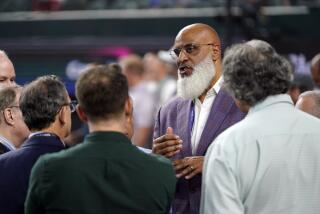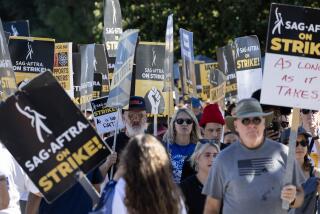Vincent Plan Scorned : Baseball negotiations: Commissioner tells union that training camp lockout would be lifted in return for a no-strike pledge for 1990 season. Fehr calls it “staged media event,” and says players should not give up right to strike.
- Share via
NEW YORK — Baseball Commissioner Fay Vincent offered to lift the spring training lockout Thursday, providing the Major League Players Assn. would pledge not to strike during the 1990 season. But the union was having none of it.
Don Fehr, executive director of the union, called the offer a “staged media event,” and said he could not reject what has never been officially proposed to him. He added he would have serious legal problems with it, and that no self-respecting union would forfeit its right to strike.
“Essentially, (the offer) is a public-relations effort,” Fehr said. “If it wasn’t, they’d have come to us with a proposal and said, ‘This is what we’d like to do, this is why, can we talk about it?’ ”
Fehr, however, said he had not learned of the development until after reporters had been informed in a news conference in the commissioner’s office late Thursday afternoon.
He acknowledged that Vincent had suggested to him recently that he might do it, and that Vincent, at the time, seemed to understand when Fehr expressed his problems with such a plan.
“Any labor lawyer . . . who is worth his salt knew it wouldn’t fly,” he said.
Vincent, however, was undeterred by Fehr’s reaction, saying that he had responded by dispatching a formal proposal to the union office.
Said Vincent: “I do not view this as ended just because Don says he has problems with it. I’m very simple-minded about this. I’m comfortable with the idea of hearing his objections and taking them to the (Player Relations Committee) to see if they can be worked out.”
Fearing a delay in the start of the regular season, admittedly frustrated and believed to be angered by the two sides’ inability to reach a bargaining settlement, Vincent was asked if he had considered attempting to solve Fehr’s concerns before holding a news conference.
“I felt the best way to operate was in a public forum and hope the players and fans will think about it,” he said, suggesting the aspect of exerting pressure on the union. “I hope Don will think some more about it and eventually accept it. One of the problems we have is that I don’t think the union shares our concern about the season.
“I mean, this is a reasonable set of propositions. It’s not public relations, it’s substantive.
“It’s a major invitation to the players to go play, draw their paychecks and let the negotiators keep working. I say the public deserves baseball.”
Added Deputy Commissioner Steve Greenberg: “If this fails, it will not be because it was a public-relations ploy but because we couldn’t resolve Don’s problems with it.”
Greenberg said he and Vincent have been considering the concept for two weeks but didn’t act sooner because of negotiating progress on several issues and the absence of a time restraint. Before making the offer Thursday, Vincent requested and received permission of the 26 clubs.
Vincent said that with negotiations less encouraging and an agreement needed “in the next few days” if the season is to open April 2, putting that start at risk in the hope of a settlement “is not an acceptable alternative.”
“However, it is equally unacceptable to substitute the current lockout for a mid-season strike,” he said in his news conference statement. “Accordingly, I am asking the clubs to open the training camps in exchange for a pledge from the players not to strike during the 1990 season.”
Twenty-five days remain before the season’s scheduled start. Gene Orza, the union’s associate general counsel, said Thursday that he thought opening day was already lost.
On Day 22 of the lockout, Vincent was asked if he would order the camps opened without a union pledge.
“I have the power to open the camps, but I’m not inclined to do that because we then would have to deal with the possibility of a strike,” he said.
“I also believe the process should be resolved by agreement. I do not like the idea of the commissioner unilaterally opening camps. I prefer an agreement by the parties. We need an agreement.”
Bud Selig, chairman of the PRC and owner of the Milwaukee Brewers, concurred. Selig, in a separate news conference that followed Vincent’s, said he was still pained by the memory of the 50-day strike in 1981.
He said the action Vincent took Thursday did not indicate the lockout had failed, but was an attempt to defuse mounting pressure in the bargaining talks, please the fans and preserve the start of the season by giving players three weeks to prepare.
Fehr scoffed at that.
If the owners are suddenly concerned about the fans, he said, which fans were they thinking about when they began planning the lockout more than a year ago and which fans were they thinking about when they emerged from their Chicago meeting Feb. 9 “with drums rolling and flags waving” and said the lockout would be implemented on Feb. 15.
He said the purpose of Vincent’s move was to create a story, put pressure on the players and divert attention from the union’s comprehensive proposal of Wednesday night, including the compromise on arbitration, which the PRC rejected without explanation Thursday, saying only that it was dismayed by the players rejection of a $4-million bonus pool for players in that category.
There are no negotiations scheduled today, but Fehr said he would be available, as did Charles O’Connor, the PRC’s general counsel.
Of his reluctance to make a non- strike pledge, Fehr cited the financial implications in playing a new season under the terms of an old contract, the possibility of the owners calling an impasse and unilaterally invoking their own terms, and the risk of ending the season without an agreement.
“What happens then?” he asked. “Do the owners stage another lockout and say, ‘Maybe we can do it better this time?’ We’re not interested in that. I mean, nobody’s threatened a strike. No strike vote has been taken. No date has been picked. You don’t do that unless you feel you have no chance (at a bargaining agreement) and we don’t feel we’re there yet.
“It is worth repeating that this dispute was not of our making. It is a dispute that from the owners’ side has been provoked by a series of actions over the past several years.
“I mean, look, we’re now 22 days into a lockout. Does somebody over there not understand that calling a lockout and imposing it has consequences? This is not a child’s game in which it doesn’t matter.”
More to Read
Go beyond the scoreboard
Get the latest on L.A.'s teams in the daily Sports Report newsletter.
You may occasionally receive promotional content from the Los Angeles Times.










